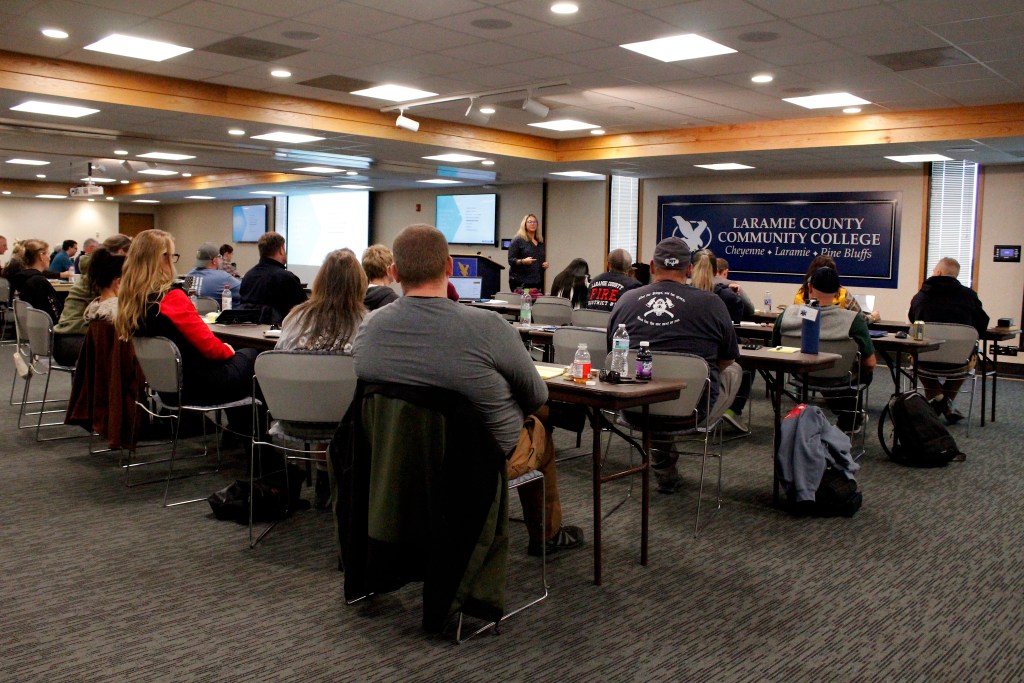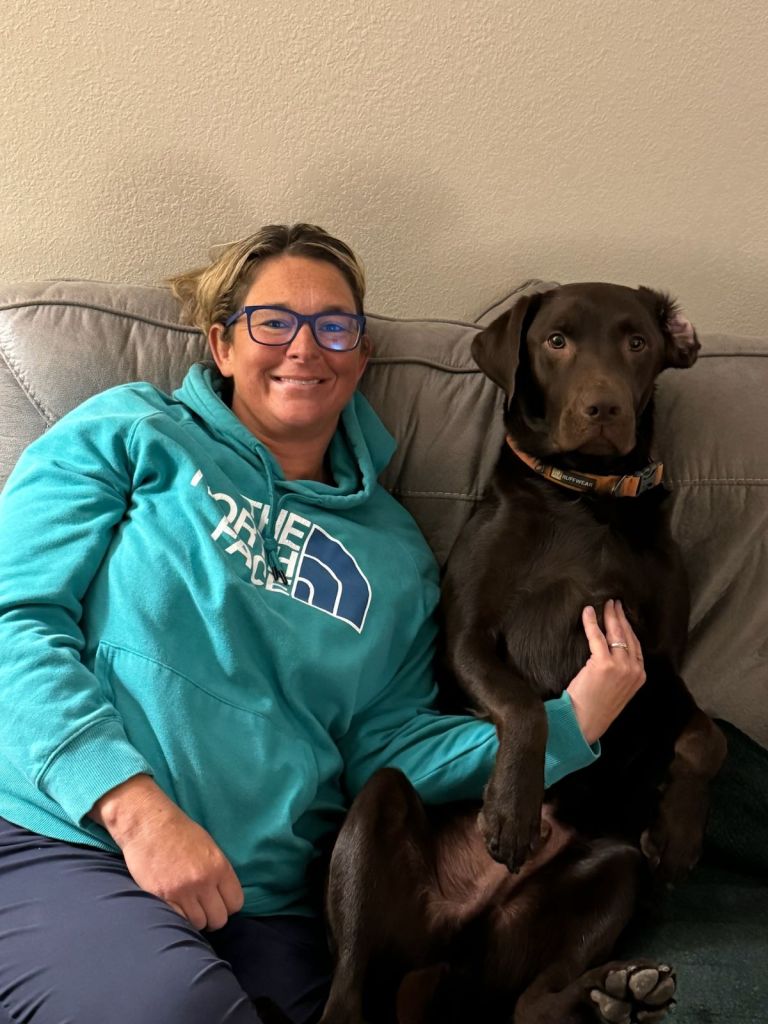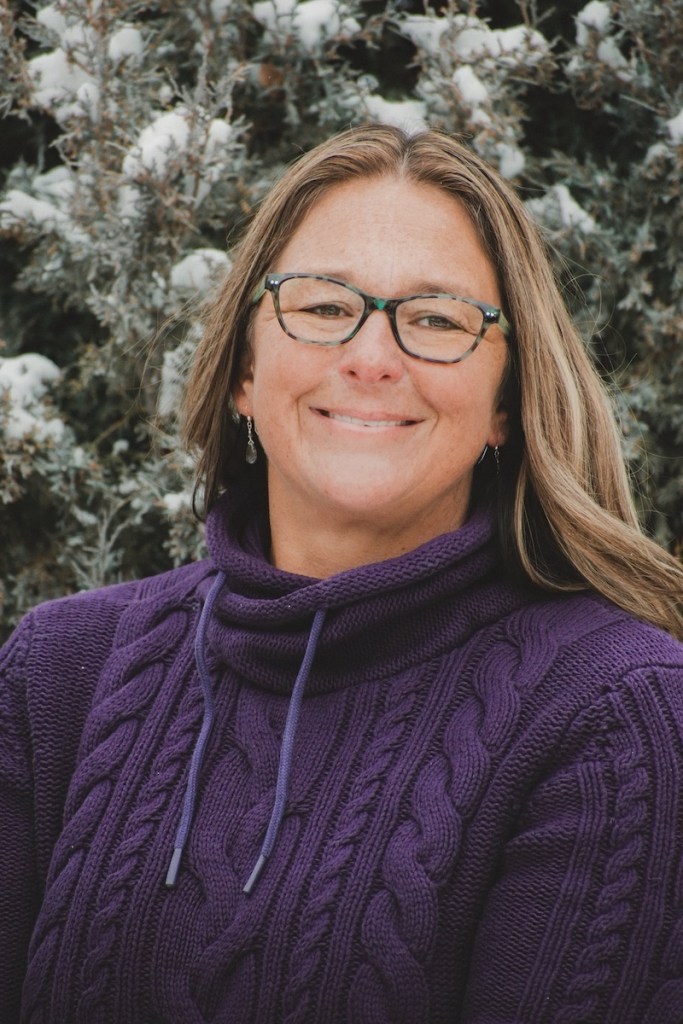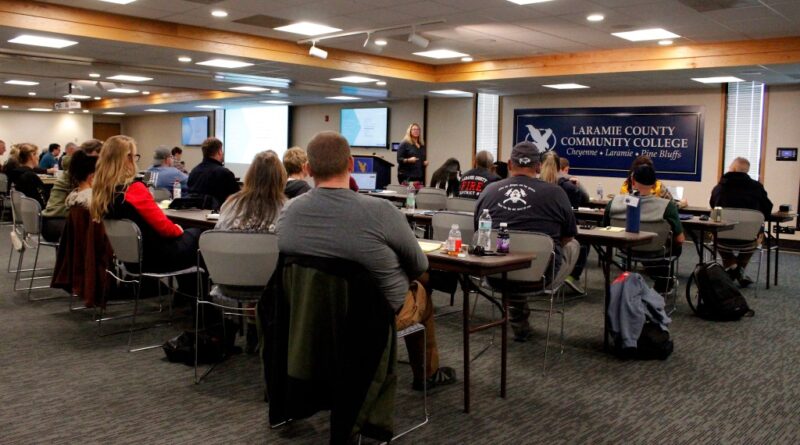He served as the first representative. Now he helps them with their mental health. – WyoFile
This story is about suicide. If you or someone you know is having suicidal thoughts, call or text the Suicide and Crisis Lifeline on 988.
Stephanie Neuman isn’t a violet, and she doesn’t mince words, but her energy is contagious.
“I offer disaster relief after you’ve been exposed to my lectures,” he told a crowd of emergency workers gathered in Cheyenne this summer.
Neuman is personable, intelligent, and jokes easily, but he takes things seriously when he needs to. In this case, that means talking about the initial exposure of the respondents. He is a former police officer turned licensed social worker in Cheyenne.
With a room full of nodding heads and buzzing voices, it was clear Neuman’s description of how the job hits home with first responders who agreed with those who attended the Laramie County Trauma Conference.
“When we go to work as first responders, we often play our game,” he said. We have energy, we love adrenaline, we are happy. We laugh, we joke, we have fun.”
That can go on for a full shift, either eight or 96 hours, he said. But it doesn’t last.
“That’s when I learned that first responders don’t go to therapy.”
Stephanie Neuman, LCSW
He said: “Then we go home and crash. “Boom. We sleep for three days. We don’t bathe, we don’t take the dog out, and we just check on him.
That leaves family, often the most important people in their lives, with a low-powered, distant version of themselves.
“Is that okay with them?” he asked. “Is that what they wrote? No.”
So first responders must learn not to use too much energy on the job, and learn to deal with what is happening on the job. And if stress and pressure from home and work build up over time, he said, it can get worse.
“When that upper limbic system [of the brain] it’s filled with service calls, divorce, financial issues, children, mental illness, illnesses, your parents have died, whatever — when it’s full, you have no room to think,” he said. Then when the 16-year-old backs the truck into the garage, you explode.
Across the country, recent suicide deaths, legal settlements and operational challenges have highlighted the continued need to support the mental health of first responders. However, convincing them to ask for help is easier said than done. What if someone doubts their ability to do the job or sees them as weak? Or what if the doctor just wants to hear the horrible facts without helping him emotionally to “be there” for his partner?
Stephanie Neuman’s tactics may be part of the solution.

Tragedy
Neuman felt his pain first hand. He started as a probation officer at the Sublette County Jail. He then worked as a patrol officer in Cheyenne at the age of 24.
He said: “I learned everything I could at school, and I was ready to take on the world. “Eight weeks after that, I was involved in shooting. a policeman.”
His boss sent him to the doctor even though he didn’t want to go, “and it was the best thing that ever happened to me,” he said.
A few years later, Neuman, who had just graduated from the FBI’s crisis communications unit, was sent to talk to a suicidal man who had a gun. and he drank. He shot himself. He went to unload the gun – something he had always known how to do – and suddenly he couldn’t remember how to do it. So he went back to therapy, which helped. Six months later, the co-worker who was involved in the death looked terrible. He hadn’t slept since he killed himself, she told him, and he hadn’t been to therapy.
“That’s when I learned that first responders don’t go to treatment,” he said.
Serious work
For Neuman, talking is not enough. A burnt, bloody or decaying body cannot be seen, so he chooses neuroscientific solutions rather than trauma.
“Talk therapy is bullshit,” he said.
Instead, he points to solutions such as brainspotting or EMDR, which stands for eye movement in desensitization and reprocessing. These techniques can reach the parts of the brain where all the trauma is stored, he said, and don’t require the other person to rehash everything they’ve been through or spend hours talking about how they’re feeling. .
“We don’t need someone to come in for fun or soft-spoken content, but we can get to the point immediately.”
Keith Groeneweg
For those still not sold on visiting a professional, he said, there are ways they can do it on their own. That includes things like positioning yourself, breathing exercises or even listening to bilingual music, which can be found for free on many streaming platforms.
“Use it with earbuds,” he said. That dual world music is like healing your brain, isn’t it? It stimulates the left brain, the right brain, and it relaxes your organ system.”
External view
Neuman’s honesty and directness put first responders at ease, according to Keith Groeneweg. He speaks their language, he said.
Groeneweg has worked with the Wyoming Highway Patrol for 30 years and now works with the Rocky Mountain Information Network to bring more mental health solutions to Wyoming. He is also a Neuman customer.
He said: “We don’t need someone to come for entertainment or light news, but to be able to speak well at once.” “Stephanie has that skill, and she puts people in court, mostly, at ease … I trust her completely.”
Neuman has a big heart, she added, and loves to go out hunting and fishing and being with her husband and son.
He said: “Those are his favorite things.” “Her husband, her son and outside.”

Sandra Brausch said Neuman is also a good shooter.
Brausch works as a technician in the same building as Neuman and they are good friends. The same goes for their dogs. Neuman brings her dog as a therapy aid, Brausch said, and the pups help guests feel at ease.
“Having her dog there can help a lot, because people can get distracted while they’re petting the dog,” Brausch said. “But [Neuman] he has this natural ability to get people talking.”
But it’s not just buyers and dog fans who relate to Neuman, Brausch said: It’s just about everyone. Brausch remembers all the times he watched Neuman strike up conversations with complete strangers like trampoline park employees or flight attendants.
“How do you sum up a person?” Brausch said. “It is very difficult to do that because [Neuman] he is such a visionary… he naturally knows what people need. ”
Although Brausch has experience working with traumatized veterans and people facing death, he said Neuman taught him how to work for police and other first responders outside of the military.
He said: “You cannot separate one traumatic event from the next. “[Neuman] it was able to make me more aware of the political situation and the administrative situation in the departments here, and that helped a lot.”
Neuman’s work is of great benefit to other physicians and consumers alike, Brausch said.
“He’s definitely in the top five doctors I’ve ever worked with,” Brausch said. He is amazing, and I am lucky to be such good friends and work with him.
Past and future
Neuman did not voluntarily leave law enforcement to become a mental health professional.
She became depressed about 10 years later and felt unsupported, she said. He pushed back against some of the higher ranks, and said that ended his shot.
He said: “Now I call it a blessing, because it’s the best thing I’ve ever done.”
Neuman now talks to first responders and other mental health providers about what EMTs, paramedics, police officers and firefighters need.

“I do a lot of training for paramedics and first responders because there are a lot of professionals who don’t understand how to live with that difficult personality,” he said. they’re in love, and the client, the first responder, is like: ‘Go kill yourself.’
Almost all of them have PTSD to some degree, he said, and that tends to make for dark humor even in extreme cases. He said they don’t need coddling, they need therapy.
He is working on a subscription platform for law enforcement who may want to pay a small fee to access his videos, talking about mental health and what they need from their jobs and living well. .
For those who need help, Neuman said they are free to contact her by email at stephanie@leavetraumabehind.com. But beyond her, she hopes more mental health providers will learn how much more help this hard-working, traumatized group needs to get around.
First responders may also seek specific therapies, he said, including EMDR and mindfulness. He also recommends books such as “The Body Keeps Score” by Bessel van der Kolk and “Emotional Survival for Law Enforcement” by Kevin Gilmartin.
Ultimately, he just wants to help the people he knows need it the most.
“I try to be as professional as possible, but at the end of the day, when you talk about helping first responders or helping people, the truth is, sometimes you say things that no one will they speak.”
BEFORE YOU LEAVE… If you learned something from this article, pay it forward and contribute to WyoFile. Our work is funded by readers like you who are committed to unbiased journalism that works for you, not for algorithms.
#served #representative #helps #mental #health #WyoFile
